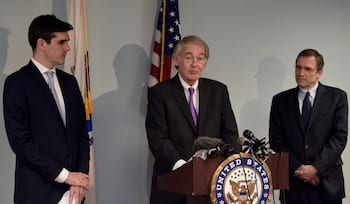
U.S. Sen. Ed Markey (center) holds press conference about the president’s infrastructure plan with Transportation for Massachusetts Director Chris Dempsey (left) and MMA Executive Director Geoff Beckwith.
President Donald Trump unveiled his national infrastructure plan and federal budget proposal today, but both bills face a steep climb in Congress.
The infrastructure plan would commit $200 billion in federal funds over the next 10 years with the hope of leveraging $1.3 trillion in capital spending from state and local governments and private investors. The plan does not offer specific proposals for bridging the gap between federal funding and other sources, but clearly would require states and municipalities to cover a far larger percentage of project costs.
The administration also stated its desire to speed up federal approval of projects, though critics have cautioned the president not to cut environmental, labor, and other protections under the guise of streamlining.
The largest funding piece in the infrastructure plan, which faces strong critics in Congress, is $100 billion intended for distribution to states and municipal governments as matching funds. The federal portion of project funding would be capped at 20 percent, leaving states and municipalities responsible for the remaining 80 percent of project costs. This would constitute a reversal of the funding ratio from the Federal Highway Trust Fund, thereby requiring more state dollars to pay for local projects and imposing heavier burdens on local governments.
At a press conference today with U.S. Sen. Edward Markey, MMA Executive Director Geoff Beckwith called the president’s plan “a major disappointment” for cities and towns in Massachusetts.
“What we need is a president and a federal government that provide a strong cable of support that can pull us up and help support and leverage true and real investment,” he said. “Unfortunately, the plan being unveiled today is a thread that won’t be able to lift up much at all.
“The recent practice has been that the federal government will provide $4 for every $1 a state or local government invests in public infrastructure,” he said. “But under the [president’s] plan, that equation would flip, and cities and towns and states would have to find 92.3 percent of the money” for infrastructure projects.
“If we at the local level had 92 percent of the money [needed for road, school, and water and sewer projects], we’d be doing that now.”
The president’s plan is expected to make it more difficult to maintain roads in a state of good repair in Massachusetts by diverting funds away from the Chapter 90 local road and bridge program, as well as from other important state programs such as MassWorks.
The president’s plan also appears unlikely to help close an estimated $17.8 billion in unmet spending needs over the next 20 years for drinking water, wastewater and stormwater infrastructure in Massachusetts.
Federal budget
The president’s budget proposal would make deep cuts to domestic spending. The U.S. Environmental Protection Agency would face the steepest cut (30 percent), followed by the State Department and the departments of Agriculture, Labor, and Health and Human Services. With the exception of the State Department, each of these agencies has an impact on local governments, and the consequences of the cuts would be felt almost immediately in cities and towns.
Local leaders have voiced concerns about proposed cuts to the EPA’s Brownfields and Superfund programs, which help cities and towns assess, clean up and revitalize contaminated properties that are a danger to the environment and public safety.
Since its inception in 1995, the Brownfields Program has helped communities reinvest in these properties, which leads to economic development opportunities, protects the environment, and increases the local tax base. The EPA offers assessment grants, cleanup grants, area-wide planning grants, and revolving loan fund grants. Over 21 years, the program has provided a total of $120 million to municipalities and other entities in Massachusetts.
The budget would eliminate several important Housing and Urban Development programs, including the HOME Investment Partnerships Program (to support local housing strategies designed to increase homeownership and affordable housing opportunities for low-income Americans) and Choice Neighborhoods. The budget would also end support for New Starts transit funding, Transportation Investment Generating Economic Recovery (TIGER) grants for key transportation projects, and the Economic Development Administration.
Of particular concern to many municipal leaders is the potential elimination of Community Development Block Grants, a program that has provided an immense benefit to municipal governments across Massachusetts in their efforts to boost economic development and stimulate housing development. While the program is federally funded, it has been administered by the Massachusetts Department of Housing and Community Development since 1982.
In the last seven years, 44 percent of the eligible communities in Massachusetts have received CDBG grants of some kind, with $237 million distributed through 321 grants, with an average value of $741,000. The average population of a grant community is 10,213. These smaller communities are particularly dependent on CDBG grants for larger projects. (For more on CDBG use in Massachusetts, visit
http://tinyurl.com/MassCDBG.) In 2016, the Baker-Polito administration awarded $28 million in CDBG grants through the DHCD.
The National League of Cities said the president’s budget cuts “represent a historic disinvestment from cities and local governments.” The proposal also generated strong opposition from the U.S. Conference of Mayors, the National Association of Counties, the American Planning Association, and many other municipal groups.
Congress disregarded a similar spending blueprint last September, passing instead a budget that level-funded many of the programs that the president sought to cut.
Written by MMA Legislative Analysts David Lakeman and Victoria Sclafani
